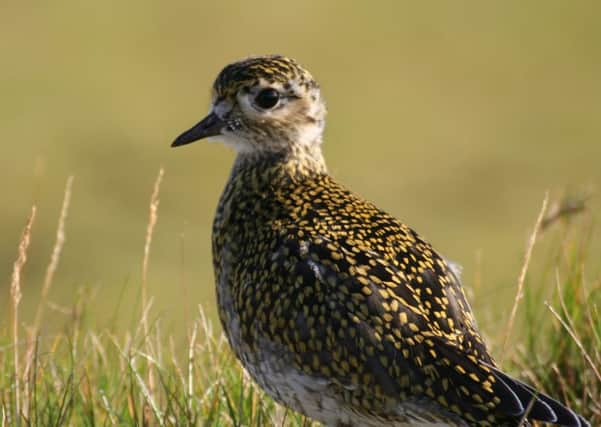80% drop in Golden Plover numbers reported at Sutherland wind farm


An RSPB Scotland study examined the number of golden plovers at Gordonbush wind farm in Sutherland for five years before, during and after its construction.
The study found plover numbers dropped by 80 per cent within the wind farm during the first two years of operation, 2012 and 2013, markedly greater declines than in the surrounding areas.
Advertisement
Hide AdAdvertisement
Hide AdThe golden plover is protected under EU law and is subject to special conservation measures.
Lead researcher Dr Alex Sansom said: “Golden plovers breed in open landscapes and it is likely that the presence of wind turbines in these areas leads to birds avoiding areas around the turbines.
“This study shows that such displacement may cause large declines in bird numbers within wind farms. It will be important to examine whether these effects are maintained over the longer term at this site, and we should also use these detailed studies to examine the effects of wind farms on other bird species.”
Aedan Smith, head of planning and development for RSPB Scotland, said more renewable energy projects are needed to tackle the harmful impact of climate change on wildlife but the sites chosen for developments such as wind farms need to ensure wildlife is not put at risk.
He added: “Fortunately, the vast majority of wind farms pose no significant risk to our wildlife. This important study shows that bird numbers can be seriously affected by badly sited wind farms in more ways than simply colliding with turbine blades, and highlights the importance of getting things right at the outset, so that impacts can be avoided.”
The charity objected to the 35-turbine scheme when the development was first proposed, claiming it was not a suitable site for a wind farm.
An SSE spokesman said: “From the outset SSE has worked in partnership with RSPB Scotland to minimise any potential risk to the golden plover population in the Gordonbush area and SSE has funded RSPB’s research.
“Other long-term studies at other Scottish wind farms have generally shown that golden plover numbers are not adversely affected by wind turbines, and we have a long-term habitat management plan in place at Gordonbush.
Advertisement
Hide AdAdvertisement
Hide Ad“SSE regards itself as a responsible developer that always engages with all relevant bodies, including Scottish Natural Heritage, with respect to our ongoing environmental obligations.”
